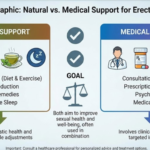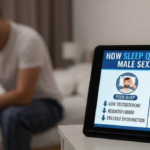Sleep disorders have become increasingly prevalent across the United Kingdom, with millions of adults experiencing various forms of insomnia. As we navigate through 2025, the demand for effective sleep medications continues to rise, making it crucial to understand treatment options like Zopiclone 10mg. This comprehensive guide explores everything UK residents need to know about this sleep medication, its uses, dosage considerations, and important safety information.
What is Zopiclone?
Zopiclone is a type of sleeping pill that can be taken for short-term treatment of severe insomnia. It helps you fall asleep more quickly, and also helps stop you waking up during the night. It works by affecting a calming chemical in your brain called gamma-aminobutyric acid (GABA).
Zopiclone, sold under the brand name Imovane among others, is a nonbenzodiazepine, specifically a cyclopyrrolone, used to treat insomnia. While molecularly distinct from benzodiazepine drugs, Zopiclone’s mechanism of action is similar, whereby it increases the normal transmission of the neurotransmitter gamma-aminobutyric acid (GABA) in the central nervous system, via positive allosteric modulation at GABAA neurons.
Zopiclone is a benzodiazepine-related sleeping pill. It is also known by the trade name Zimovane. It is a class C controlled medicine, which means it’s regulated under UK drug legislation due to its potential for dependence and misuse.
Understanding Zopiclone 10mg Dosage
Standard UK Prescribing Guidelines
Zopiclone tablets come in 2 different strengths: 3.75mg and 7.5mg. The usual dose is one 7.5mg tablet, taken just before you go to bed. It takes around 1 hour to work. A lower dose of 3.75mg may be recommended to begin with if you’re over 65 years old or have kidney or liver problems.
It’s important to note that while Zopiclone 10 mg (a sedative-hypnotic) is widely used to treat acute and chronic insomnia in some countries, the standard licensed doses in the UK are typically 3.75mg and 7.5mg. The 10mg strength is not commonly prescribed through standard NHS channels and may represent an unlicensed or imported medication.
Clinical Effectiveness
Zopiclone is a hypnotic agent, and a member of the cyclopyrrolones compounds. It rapidly initiates and sustains sleep without reduction of total REM sleep and with preservation of slow wave sleep. Negligible residual effects are seen the following morning.
Research shows that Zopiclone has been found to prolong stage N2 and N3 sleep with a proportional decrease in total REM sleep. Research also shows that it can reduce stage N1 sleep, indicating its ability to improve sleep quality by increasing deeper sleep stages.
How Zopiclone Works
Zopiclone belongs to a class of medications known as “Z-drugs” or non-benzodiazepine hypnotics. Unlike traditional benzodiazepines, zopiclone specifically targets GABA-A receptors in the brain, which are responsible for promoting relaxation and sleepiness.
The medication works by:
Enhancing GABA Activity: By increasing the effectiveness of GABA, the brain’s primary inhibitory neurotransmitter, zopiclone helps calm neural activity and promote sleepiness.
Rapid Sleep Induction: The medication typically begins working within 30-60 minutes of ingestion, helping users fall asleep more quickly than they would naturally.
Maintaining Sleep Continuity: Zopiclone helps prevent frequent night-time awakenings, allowing for more consolidated, restorative sleep periods.
Preserving Sleep Architecture: Unlike some other sleep medications, zopiclone maintains important sleep stages, particularly slow-wave sleep, which is crucial for physical restoration and memory consolidation.
Approved Uses and Indications
Primary Indications
Zopiclone is used for the short-term (7-14 days) treatment of insomnia in adults. It is used to treat adults who have sleep problems such as: difficulty falling asleep, frequent night-time awakenings, early morning awakening.
The medication is specifically indicated for:
Acute Insomnia: Sudden onset sleep difficulties often triggered by stress, life changes, or temporary circumstances.
Chronic Insomnia: Long-term sleep difficulties that significantly impact daily functioning and quality of life.
Anxiety-Related Sleep Problems: It also helps treat sleeping problems that are caused by anxiety or feeling of nervousness. It improves sleep, hence providing a better sleep experience.
Treatment Duration Guidelines
It’s usually prescribed for just 2 to 4 weeks. This is because your body gets used to it quickly and after this time it’s unlikely to have the same effect. Your body can also become dependent on it.
Long-term use is not recommended, as tolerance, dependence, and addiction can occur. This limitation makes zopiclone primarily suitable for short-term sleep crisis management rather than long-term sleep maintenance.
Dosage Guidelines and Administration
Standard Dosing Protocol
For most UK adults, the standard approach involves:
Initial Assessment: Healthcare providers typically start with the lowest effective dose to minimize side effects and dependence risk.
Standard Adult Dose: 7.5mg taken once daily, approximately 30-60 minutes before intended bedtime.
Elderly or Compromised Patients: 3.75mg may be prescribed for older adults or those with liver or kidney impairment.
Higher Doses: While 10mg formulations exist, they’re not standard in UK prescribing and would typically only be considered under specialist supervision.
Timing and Administration
Bedtime Administration: Zopiclone should only be taken when you can dedicate 7-8 hours to sleep, as the medication can cause morning drowsiness if sleep time is insufficient.
Food Interactions: The medication can be taken with or without food, though heavy meals may delay absorption slightly.
Onset of Action: Effects typically begin within 30-60 minutes, with peak effectiveness occurring 1-2 hours after ingestion.
Benefits of Zopiclone Treatment
Immediate Sleep Benefits
Faster Sleep Onset: Most users experience significantly reduced time to fall asleep, often from over an hour to less than 30 minutes.
Reduced Night Wakings: The medication helps maintain sleep continuity, reducing the frequency and duration of nighttime awakenings.
Improved Sleep Quality: Users often report feeling more rested upon waking, indicating better sleep depth and quality.
Consistent Sleep Timing: Regular use during treatment periods can help establish more predictable sleep patterns.
Quality of Life Improvements
Enhanced Daily Functioning: Better sleep translates to improved concentration, memory, and overall cognitive performance during daytime hours.
Mood Stabilization: Adequate sleep helps regulate mood, reducing irritability, anxiety, and depressive symptoms often associated with chronic sleep deprivation.
Physical Health Benefits: Quality sleep supports immune function, hormone regulation, and overall physical health maintenance.
Relationship Benefits: Improved sleep often leads to better interpersonal relationships and reduced strain on family and work dynamics.
Side Effects and Safety Considerations
Common Side Effects
Common side effects are a metallic taste in your mouth, a dry mouth, and daytime sleepiness.
Additional frequently reported side effects include:
Metallic Taste: One of the most characteristic side effects, often described as bitter or unpleasant taste that may persist into the following day.
Morning Drowsiness: Despite being designed to minimize next-day effects, some users experience residual sleepiness, particularly with higher doses.
Dry Mouth: Reduced saliva production during sleep can lead to morning mouth dryness and potential dental health considerations.
Dizziness: Some users report feeling unsteady, particularly when getting up during the night or in the morning.
Serious Safety Concerns
Dependency Risk: Zopiclone 10mg is not recommended for long-term use (more than 4 weeks) for chronic insomnia because it may cause tolerance and dependence.
Memory Effects: Some users experience anterograde amnesia, particularly if they don’t get adequate sleep time after taking the medication.
Complex Sleep Behaviors: Rare but serious side effects include sleep-walking, sleep-eating, or sleep-driving with no memory of these activities.
Withdrawal Symptoms: Sudden discontinuation after regular use can lead to rebound insomnia, anxiety, and other withdrawal symptoms.
Legal Status and Prescription Requirements in the UK
Controlled Substance Classification
As a Class C controlled substance in the UK, zopiclone requires a valid prescription from a licensed healthcare provider. This classification reflects its potential for abuse and dependence.
NHS Prescribing Guidelines
NHS prescribers follow strict guidelines when prescribing zopiclone, including:
Short-term Use Only: Prescriptions are typically limited to 7-14 day supplies with specific justification required for longer courses.
Regular Review: Patients on zopiclone require regular medical review to assess effectiveness and monitor for signs of dependence.
Alternative Considerations: Healthcare providers are encouraged to explore non-pharmacological sleep interventions before prescribing zopiclone.
Private Prescription Options
Some private healthcare providers may offer zopiclone prescriptions with different dosing schedules or formulations, but these still must comply with UK drug safety regulations.
Interactions and Contraindications
Drug Interactions
Zopiclone can interact with numerous medications, including:
Central Nervous System Depressants: Alcohol, opioids, and benzodiazepines can dangerously enhance zopiclone’s sedative effects.
Antidepressants: Some antidepressants may alter zopiclone metabolism or enhance side effects.
Antihistamines: Over-the-counter allergy medications can increase drowsiness and confusion risk.
Medical Contraindications
Zopiclone may not be suitable for individuals with:
Severe Respiratory Disorders: The medication can depress breathing, making it dangerous for those with sleep apnea or severe lung disease.
Liver Disease: Impaired liver function can affect drug metabolism, requiring dose adjustments or alternative treatments.
History of Substance Abuse: Previous addiction issues increase the risk of zopiclone dependence.
Pregnancy and Breastfeeding: The medication can affect fetal development and is excreted in breast milk.
Alternatives and Complementary Approaches
Non-Pharmacological Interventions
Cognitive Behavioral Therapy for Insomnia (CBT-I): Evidence-based psychological treatment that addresses underlying thoughts and behaviors affecting sleep.
Sleep Hygiene Education: Implementing environmental and behavioral changes to promote natural sleep.
Relaxation Techniques: Progressive muscle relaxation, meditation, and breathing exercises can help reduce pre-sleep anxiety.
Alternative Medications
Other Z-drugs: Zolpidem and zaleplon offer similar mechanisms with different duration profiles.
Low-dose Antidepressants: Certain antidepressants have sedating properties useful for sleep disorders.
Melatonin: Natural hormone supplements that can help regulate circadian rhythms.
Conclusion
Zopiclone 10mg represents a potentially effective but carefully regulated treatment option for severe insomnia in the UK. While the medication can provide significant short-term relief for sleep difficulties, its use must be balanced against potential risks including dependence, side effects, and the importance of addressing underlying sleep disorder causes.
UK residents considering zopiclone treatment should work closely with qualified healthcare providers to ensure appropriate prescribing, monitoring, and support for both pharmacological and non-pharmacological approaches to sleep improvement. The goal of any sleep medication should be to provide temporary relief while implementing long-term strategies for sustainable sleep health.
Remember that while zopiclone can be highly effective for short-term sleep crisis management, the most successful approach to chronic insomnia typically involves comprehensive treatment that addresses lifestyle factors, underlying health conditions, and behavioral patterns that contribute to sleep difficulties. Always consult with a healthcare professional before starting or stopping any sleep medication to ensure safe and appropriate treatment.








